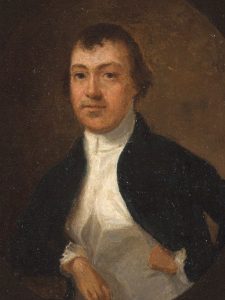Whether as a result of
the passionate request submitted by the noted citizens of the Greenbrier Valley or for another reason unknown, the Virginia General Assembly passed an act on December 21, 1821, creating a new county. Although the act states that the new county is coming from the existing counties of Bath, Pendleton, and Randolph, the description given takes almost all the land for the new county from Bath, a small amount from Pendleton, and very little acreage from Randolph.
From the Establishing Act
The first section of the act creating the new county, gives its boundaries as requested and gives it the name Pocahontas. No reason is given for the choice of this name. The famous Native American lady had no connection with this part of Virginia. The petition requesting the new county did not suggest any names for the county. The governor of Virginia at this time, Thomas Mann Randolph, Jr., was a descendant of Pocahontas and perhaps he suggested the name to the Assembly to honor his ancestor.
The justices for the new county of Pocahontas were not selected until another act was passed by the General Assembly. However, the date for this act has not been found. It named John Jordan, William Poage, Jr., James Tallman, Robert Gay, George Poage, Benjamin Tallman, John Baxter, and George Burner as justices. The final action by the General Assembly to get Pocahontas County ready to go was passed on February 15, 1822, with the passage of an act that named William Poage, Jr. or John Baxter to administer the oaths of office to the Pocahontas County justices.
The justices held their first meeting at the home of John Bradshaw in Huntersville on March 5, 1822, as directed by the act creating the county. The report from the commissioners named in the act creating the county to select the site for county government, was not yet received. At the June 1822 meeting of the justices, the report was received and Huntersville was named as the county seat. The minutes of that meeting report that Edray had also been considered as a possible location for the county seat.
Two changes to the County border give it the shape it has today.
The “genealogy” of the Pocahontas County traces back to Orange County, which was created in 1734.
- From Orange County, Augusta County was formed in 1738. Augusta took in almost all of the future state of West Virginia. Another county coming out of Orange was Frederick County in 1743.
- A number of counties were created out of Augusta that are ancestors of Pocahontas County. These include Botetourt, 1770, Monongalia, 1776, and Rockingham, 1778,
- Formed out of Augusta and Frederick was Hampshire County in 1754.
- Hardy County was created out of Hampshire in 1786.
- Greenbrier County was created from Botetourt in 1778.
- Harrison County’s land came from Monongalia in 1784, and Randolph was created from Harrison in 1787
- The next “generation” before Pocahontas was the formation of Pendleton County from Augusta, Rockingham, and Hardy in 1788 and Bath County from Augusta, Botetourt, and Greenbrier in 1790.
- As stated in the act creating Pocahontas County, its land came from Bath, Pendleton and Randolph Counties.
Original Petitioners
John McCarty,
James Kerr,
Francis W. Pukins, (probably Perkins)
Joseph Woodle, jr.,
Daniel Matheney,
John Sharp,
William Campbell,
John May,
Henry Harold,
Isaac Moor,
Lantz Lockridge,
Wm. Callahan,
Peter Harold,
James Waugh,
Christopher Harold,
William Wanless,
William Nichols,
James Grimes,
Michael Cleek,
James Piles,
Jacob Seybert,
Weston Mills,
Abraham Seybert,
Joseph Seybert,
Samuel Cummings,
Jacob Arbaugh,
Alex. Morrison,
William Blair,
Daniel Collison,
John Clutter,
Absalison Morrison,
Josiah Jacocks,
Jas. Morrison,
David Jacocks,
John Erwing, jr.,
John Bradshaw,
Thomas Wooddell,
Patrick Bruffey,
Alexander Gillaspie,
John Galford,
Jacob Warrick,
David Derrer,
James Gillaspie,
Darel Friell,
Arthur Grimes,
Boon Bollman,
John Jordan,
Jacob Piles,
Daniel Kelison,
Samuel Hawk,
Moses Hughes,
George Hughes,
John Arbaugh,
Daniel Alderman,
Jacob Neff,
Anthony Lighter,
Soloman Buzzard,
John Neff,
John Ervine,
Samuel Dougherty,
Charles Grimes,
Joseph Moore,
William Nichols,
Samuel DeNickles,
James Deber,
Eather Holcombe,
Daniel Aldman,
Wm. Rucker,
David Deeve,
John Dewer,
Isaac _____,
George Burnley,
___ Hill,
Thomas Hill,
Amos Kennison,
David Kennison,
James Kennison,
Nathan’l Kennison,
Wm. Kennison,
Robert Grey,
John Young, Sr.,
John Gililand,
Francis Piles,
Nathaniel Gililand,
Wm. Cackley,
John S. Ewing,
Abraham McNeil,
John Woodell,
James Diggens,
John Lunsford,
Jacob Nuttingham,
Martin Delley,
Jacob Lightner,
James Sharp,
Jonathan Giffin,
John Gilliland,
Timothy _____,
James Brindley,
James Allen,
John McNeil, Sr.,
Benjamin Cackley,
Mark Kinnison,
Davis Kinnison,
Thomas Hill,
Richard Hill,
John Hill,
Abraham Hill,
William Hill,
Isaac Hill,
Isaac Hawk,
John Coulter,
Wm. M’Coy, Sr.,
Wm. Moore,
Peter Lightner,
John Kelley,
James Cooper,
D. Hopkins Smith,
Levi Moore,
James Young,
Robert Erwin,
Nathan Gilliland,
Samuel McCoy,
William Hughes,
Renick Brown,
Jonathan Jordon,
Thomas Jordon,
Amos Kinnison,
Benjamin Wallace,
Edward Killison,
Rolph Wanless,
Tho’s Hatton,
George Harrison,
James Sharp,
Alex. Waddell,
Joseph Friel,
William Deever,
John Deever,
Stephen Wanless,
Thomas Bradshaw,
Ruben Buzzard,
William Sharp,
Joseph Sharp,
Jacob Grop,
John Bird
